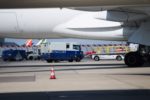
Home » SPECIAL ISSUE: GLOBAL SUPPLY CHAIN PARTNERSHIPS
SPECIAL ISSUE: GLOBAL SUPPLY CHAIN PARTNERSHIPS
It's hard enough implementing a new transportation model when one nationality is involved. But when the principals hail from three countries, the chances of failure are greatly magnified.
To plot the movement of automotive parts into a Mexican manufacturing plant, and the return of finished components into the U.S., Denso Manufacturing Tennessee Inc. had to bring together American, Mexican and Japanese planners. On top of that was the need to involve freight forwarders, customs brokers, truckers and the customs agencies of two nations.
Denso Manufacturing Tennessee is one of many divisions of Denso Corp., among the world's largest Tier 1 automotive component suppliers, with headquarters in Kayira City, Japan. Most of the company's products are electrical in nature, consisting of dashboard components and subassemblies. Individual product groups include speed valves, cruise controls, and fuel valves and filters. Customers are all of the major automakers - Honda, Saturn, Nissan, Toyota (Denso's parent) among them.
The Tennessee operation, based in Maryville, consists of a 10,000-square-foot cross-dock facility. Denso keeps no more than two days of finished goods inventory there, and barely a day's worth of parts from its suppliers. Its purpose is to consolidate small shipments of parts from some 35 North American suppliers, then move them in truckload quantities to Denso's plant in Monterrey, Mexico.
Finished components come back on the same vehicles, then are distributed from Maryville to manufacturers. The arrangement had to be in both directions because automakers didn't want the headache of getting parts over the border into their plants, says Paige Rose, Denso's assistant manager of distribution.
Planners spent a grueling six months working out the details of the network. "It flew by for me," says Rose. She worked countless 12-hour days on the project, "looking at it every way, like a Rubik's Cube."
The ultimate carrier of choice was Joplin, Mo.-based Contract Freighters Inc. (CFI). At the start, it was one of several truckers working for Denso under the control of a freight forwarder. But as shipments grew in volume and variety, service consistency became a critical issue.
Denso eventually named CFI its exclusive carrier on that route. "We were the only ones that showed up on time," says Gary Nichols, CFI's director of business development.
Rose says Denso chose CFI from among 15 carriers. "A lot didn't have the depth of equipment and resources to back us up in the case of a breakdown." In fact, she says, many had no contingency plans at all.
Begun about four years ago, the project was intended to minimize the cost and number of trucks feeding parts into the Monterrey maquiladora plant, Rose says. Southbound shipments now depart from Tennessee on a daily basis. At the border, CFI turns them over to a Mexican trucker.
The first line of defense against supply-chain disruption is prevention. All of Denso's cross-border movements in both directions have been worked out with customs officials in advance. Mexican Customs receives a list of every component to be imported. Because they will be exported for consumption outside Mexico, items enter the country duty free. Nichols says Denso worked hard to improve the accuracy of its documentation, to minimize the chances of getting a "red light" from Customs.
The handoff between carriers, another stage with the potential for delay, is equally smooth. Segrove, Denso's freight forwarder and customs broker on both sides of the border, informs the Mexican trucker of a trailer's availability in Nuevo Laredo. The shipment is then taken directly to the plant in Monterrey, without stopping at a consolidation terminal. That arrangement "takes hours out of the system," Nichols says.
CFI builds an extra 12 hours into the plan, in case a shipment is stopped at the border for inspection. Nevertheless, says Rose, the trucker provides a consistent, 36-hour transit from Maryville to Monterrey, door to door. Nichols says most trucks arrive within less than an hour of their expected delivery time.
Denso appears eager to involve CFI in more of its business. As of late spring, the carrier was in "top contention" to move shipments between Battle Creek, Mich. and Long Beach, Calif. in the U.S., and a Denso plant in Monclova, Mexico. Nichols says CFI was planning to expand its service at several locations in both countries, with just-in-time delivery of parts.
The key to success, Nichols says, is tight coordination among partners. "If one of the vendors in the supply chain is weak or doesn't have a sense of urgency, they can compromise everything," he says. "They can turn the entire transaction upside down.
RELATED CONTENT
RELATED VIDEOS
Subscribe to our Daily Newsletter!
Timely, incisive articles delivered directly to your inbox.
Popular Stories

2024 Supply Chain Management Resource Guide: There's Only One Way Off a Burning Platform
VIEW THE LATEST ISSUECase Studies
-
Recycled Tagging Fasteners: Small Changes Make a Big Impact
-

Enhancing High-Value Electronics Shipment Security with Tive's Real-Time Tracking
-

Moving Robots Site-to-Site
-
JLL Finds Perfect Warehouse Location, Leading to $15M Grant for Startup
-
Robots Speed Fulfillment to Help Apparel Company Scale for Growth



